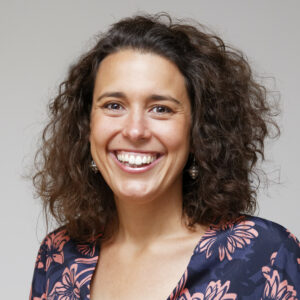An interview with Gabriela Erice, Senior Microfinance Officer, European Microfinance Platform (e-MFP)
Gabriela Erice is specialised in microfinance and has been working at the European Microfinance Platform (e-MFP) for 5 years.
How did you get involved in inclusive finance?
I have always been interested in development cooperation. For four years, I worked as parliamentary assistant in the field of economy and financial services to a Member of the European Parliament in Brussels. However, I wanted to pursue my career in a social-related field. I thought microfinance would be the perfect choice to bring together my financial expertise and my interest in development. I decided to specialise so did the Masters in microfinance of the Autónoma de Madrid University and then had a field experience in a microfinance institution in Colombia. I came back to Europe in 2013 and started working for the European Microfinance Platform (e-MFP) in Luxembourg.
 Could you describe the work done by e-MFP? And what makes it different from other inclusive finance players?
Could you describe the work done by e-MFP? And what makes it different from other inclusive finance players?
e-MFP is a leading network of organisations from developed countries, mainly European, working in microfinance and financial inclusion in developing and emerging countries. It was founded in 2006 with the support of the Luxembourg government in response to a need for increased collaboration and cooperation between European actors. Initially with 20 founding organisations, nowadays it is a multi-stakeholder platform that brings together over 130 members from 28 countries. I believe the “uniqueness” of e-MFP is based on the diversity of our members that represent all financial inclusion sector stakeholders, and the broad range of topics we work on, from human resources development, to responsible exits, just to mention a few. Our agenda is set up by our members’ needs and our activities are all targeted to foster knowledge creation and sharing as well as to encourage networking and collaboration among sector players. Our activities include many expert Action Groups; our annual conference, the European Microfinance Week, which brings over 400 worldwide financial inclusion professionals to Luxembourg; the co-organisation, together with InFiNe.lu and the Luxembourg Ministry of Foreign and European Affairs of the prestigious annual European Microfinance Award; as well the production of numerous publications throughout the year, and the organisation of events around Europe to meet our members.
What projects are you currently working on?
At e-MFP, I’m mainly in charge of the European Microfinance Award and the programming of the European Microfinance Week (EMW).
Over the past months, we have been developing the selection methodology of the 2019 edition of the Award on the topic “Strengthening resilience to climate change as well as setting up the application process which is currently open for applications. The deadline to apply is April 9th. We are also working on the publication that will present the key lessons learned and the top-10 applications from the 2018 Award on Technology. Finally, though it’s a project I’m not directly involved in, I’m very excited that building on the Award 2017 on microfinance for housing, my colleagues are working on a book that will be published at the end of 2019. I think this is an excellent example of how the Award helps advance the sector by bringing together knowledge and practices from all around the world.
Regarding EMW, we are starting the preparations of the 2019 edition that will be held in Luxembourg from November 20th–22nd 2019. We’ll soon launch the request for proposals from our members that serve as the basis of the conference programme.
Recently, together with my colleagues I was involved in the set-up of an action group on refugee finance. In partnership with UNCDF we have set up an online platform to connect members so that they can collaborate and exchange in order to advance access for financial services for refugees.
What is your particular interest in inclusive finance?
The concept of “responsible finance” appeals to me as I believe that having access to responsible financial services gives excluded populations opportunities they wouldn’t have otherwise: invest in business, send kids to school, improve their homes, etc. Inclusive finance is a key part of development and a tool in working towards the Sustainable Development Goals. I also think that developed economies should put special focus on serving clients responsibly and paying attention to their social impact, in particular seeing how the banking and financial crises we’ve gone through in Europe over the past decade have affected households.
What are the biggest challenges facing inclusive finance today? And how could InFine.lu and Luxembourg help tackle them?
The inclusive finance sector operates within a fast-changing environment. There are new players such as fintech or SME finance providers that need to be aware of the principles of client protection and the importance of monitoring social performance. Our sector has developed tools and standards to assess the social performance of microfinance institutions in this field and there is strong social performance expertise available in the sector that could be useful and adapted to other sectors. Luxembourg and InFiNe.lu could play a role in raising awareness about these principles and tools among the Luxembourg financial and fintech community.
InFiNe is the Luxembourg platform that brings together public, private and civil society actors involved in inclusive finance. The value of InFiNe lies in the wide range of expertise characterised by the diversity of its members.
With the support of

Inclusive Finance Network Luxembourg
39, rue Glesener
L-1631 Luxembourg
G.-D. de Luxembourg
Tel: +352 28 37 15 09
![]()
R.C.S. : F 9956
Legal notice
Privacy notice
Picture 1 © Pallab Seth
